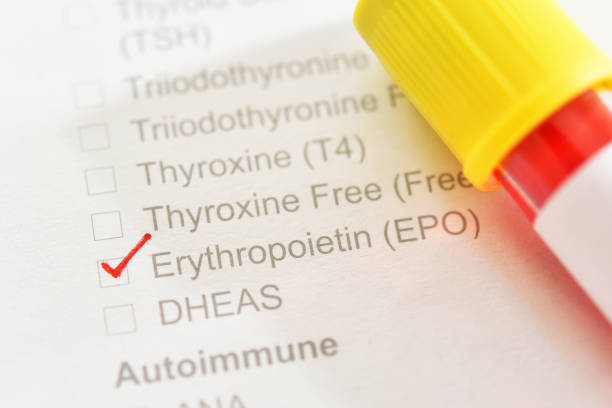
Erythropoietin or EPO is also known as hematopoietin, or hemopoietin. It is a glycoprotein cytokine that is secreted mainly by the kidneys in response to cellular hypoxia. It stimulates red blood cell production (erythropoiesis) in the bone marrow and is used medically to treat anaemia, a condition caused by a shortage of red blood cells.
Erythropoietin (EPO) helps your body maintain a healthy amount of red blood cells (erythrocytes). High or low levels of erythropoietin can cause health problems.
Functions of Erythropoietin
EPO helps make red blood cells that are required to deliver oxygen to the tissues in your body. Red blood cells also help to transport carbon dioxide to the lungs for you to exhale.
Whenever the specialised cells in your kidneys detect low blood oxygen levels, they increase the production of EPO. EPO then tells bone marrow to make more red blood cells. And when the cells in the kidneys sense that there’s sufficient oxygen in blood, they reduce the production of erythropoietin.
Certain conditions affect how much EPO the kidneys make. They may make too much or not enough, resulting in low levels of red blood cells or high levels of red blood cells.
Causes high levels of EPO
Higher EPO levels are a result of long-term or chronic exposure to low levels of oxygen. This could be due to chronic smoking or living in a high-altitude environment where air oxygen levels are lower.
Anaemia can also cause high EPO levels. Anaemia is a condition of not having enough red blood cells or red blood cells not working as they should, causing high levels of EPO because the kidneys can sense that you don’t have enough red blood cells so they release extra EPO.
Result of high erythropoietin levels
Inappropriately high levels of erythropoietin causes high levels of red blood cells. Another name for high levels of red blood cells is polycythemia.
In rare cases, certain tumours can also cause your kidneys to release inappropriately excessive EPO.
Causes of low levels of erythropoietin
The most common cause of low EPO levels is Chronic kidney disease (CKD). Damaged kidneys produce low EPO. CKD combined with low EPO levels can lead to anaemia.
Polycythemia vera can also lead to low levels of EPO. It is a type of blood cancer that causes the bone marrow to make too many red blood cells due to genetic mutation that causes low EPO levels because your kidneys sense that you have enough red blood cells, so they don’t produce as much EPO.
Diagnosis of EPO
EPO levels can be measured through a blood test. A blood test can determine what may cause a change in your blood cells that affects the release of EPO, including polycythemia, anaemia or other bone marrow conditions.
An erythropoietin (EPO) test Is used to diagnose the cause of anaemia. An EPO test is ordered in follow up to abnormal results on a complete blood count (CBC), such as a low or high red blood cell (RBC) count and low or high haemoglobin and hematocrit.
These tests help diagnose anaemia and give clues as to the likely cause of the anaemia. Erythropoietin testing determines if low EPO may be causing the anaemia.
For a person with chronic kidney disease, an EPO test may be ordered to evaluate the kidneys’ continued ability to produce enough erythropoietin. Testing also determines whether the person should receive erythropoietin replacement therapy. If the erythropoietin level is low, erythropoietin replacement therapy can help increase red cell production in the bone marrow.
An erythropoietin test may also be ordered in follow up to CBC results that show an increased number of RBCs. Testing can help to determine whether the excess production of RBCs is due to an overproduction of erythropoietin.
When is the EPO test ordered?
An EPO test may be ordered in the following conditions:
- An EPO test may be ordered when you have anaemia that is not due to iron deficiency, vitamin B12 or folate deficiency, decreased lifespan of red blood cells (RBCs; hemolysis), or by excessive bleeding.
- It may also be ordered when the RBC count, haemoglobin, and hematocrit are decreased or increased and also when the reticulocyte count is inappropriately normal or decreased.
- In a person with chronic kidney disease, erythropoietin levels may be ordered when there is a suspected kidney dysfunction that could be associated with a decrease in erythropoietin production.
- An EPO test may be ordered when there’s a suspected bone marrow disorder, such as a myeloproliferative neoplasm (MPNs) or myelodysplastic syndrome (MDS).
Key Takeaway
Erythropoietin is an essential and important hormone that tells your bone marrow when to make more red blood cells. Sometimes the body inappropriately produces too many or too few red blood cells, causing health problems. A blood test can help check the EPO in the blood and recommend the proper treatment based on the results.

